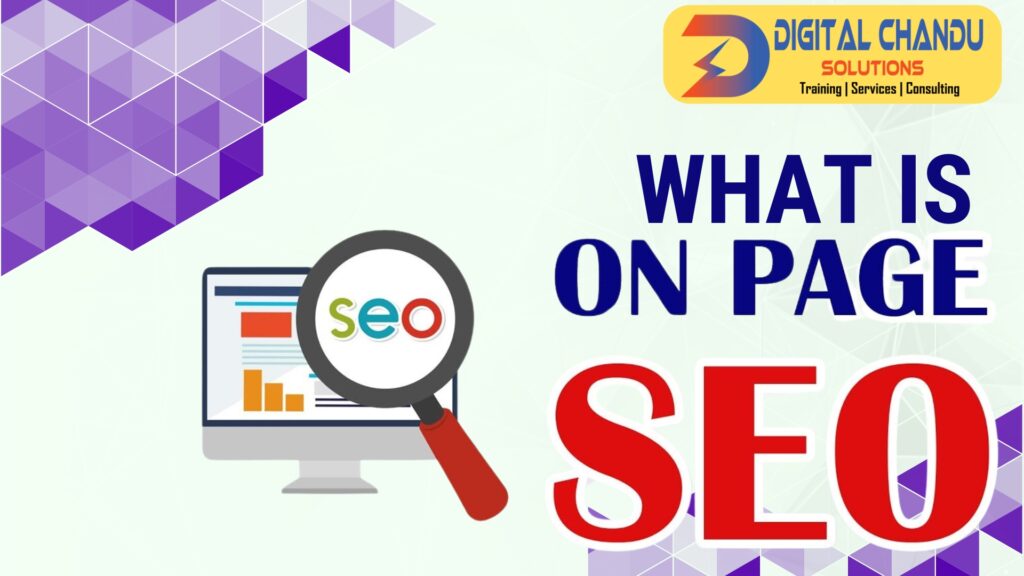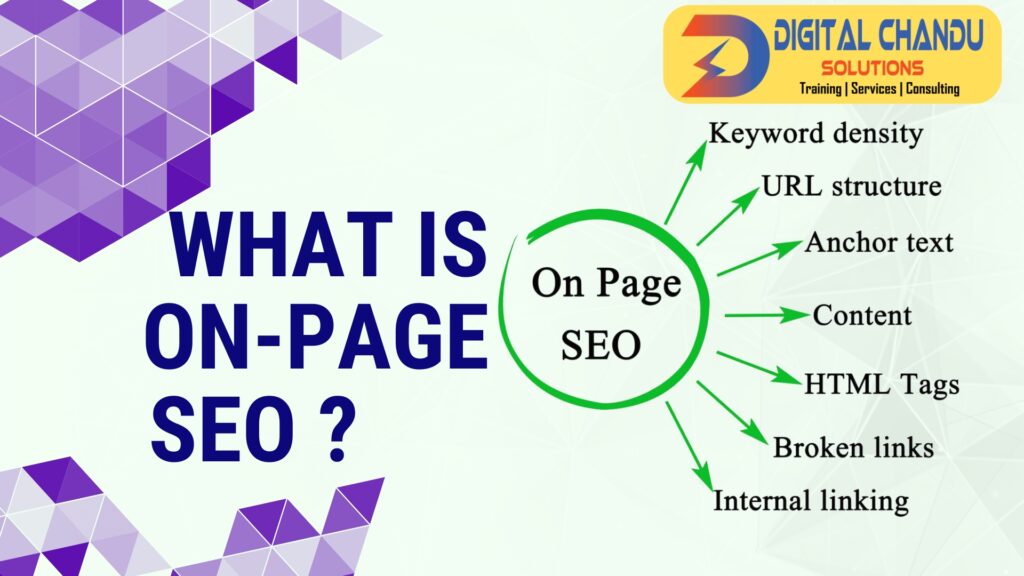Unlocking the Power of On-Page SEO: Strategies for Sustainable Online Success
What is On-Page SEO ?
In digital marketing and website optimization, on-page SEO is a fundamental pillar. But what exactly is on-page SEO, and why does it matter? In simple terms, on-page SEO refers to the optimization techniques applied directly to a website’s content and structure to improve its search engine visibility and organic traffic. Unlike off-page SEO, which focuses on external factors like backlinks and social signals, on-page SEO revolves around making your web pages more appealing and relevant to search engines and users.

Understanding the Basics
The foundation of on-page SEO lies in understanding the key elements that search engines like Google consider when ranking web pages. These elements include:
Content Quality: High-quality, relevant, and valuable content is the cornerstone of on-page SEO. Creating content that addresses user intent, provides solutions to their queries, and engages them effectively is essential.
Keyword Optimization: Strategic placement of relevant keywords throughout your content, including in titles, headings, meta tags, and body text, helps search engines understand the context and relevance of your pages.
Meta Tags: Meta tags, such as title tags and meta descriptions, provide brief yet impactful information about your web pages. Optimizing these tags with targeted keywords and compelling descriptions can improve click-through rates and search visibility.

URL Structure: Clean and optimized URLs that include relevant keywords and follow a logical hierarchy contribute to better user experience and SEO performance.
Heading Tags: Proper use of heading tags (H1, H2, H3, etc.) not only organizes your content for readers but also signals important information to search engines, enhancing the overall SEO value of your pages.
Internal Linking: Creating a network of internal links between related pages within your website improves navigation, distributes link equity, and encourages deeper exploration by users and search engine crawlers.
Image Optimization: Optimizing images with descriptive alt text, relevant file names, and appropriate sizes enhances visual appeal and contributes to SEO by improving accessibility and page load times.
Why On-Page SEO Is Crucial
The importance of on-page SEO must be considered in today’s digital landscape. Here are some compelling reasons why mastering on-page SEO is crucial for website owners and digital marketers:
Improved Search Engine Rankings: Effective on-page SEO techniques can help your web pages rank higher in search engine results pages (SERPs) for relevant keywords, increasing visibility and organic traffic.
Enhanced User Experience: By optimizing content, improving page load times, and ensuring mobile responsiveness, on-page SEO contributes to a positive user experience, leading to lower bounce rates and higher engagement metrics.
Targeted Audience Reach: Tailoring your content and optimization efforts to specific keywords and user intent helps attract a targeted audience interested in your products, services, or information.
Competitive Advantage: Websites that excel in on-page SEO gain a competitive edge by standing out in search results, attracting more qualified leads, and establishing authority and trust with users.
How to Do On-Page SEO: A Step-by-Step Guide
On-page SEO is crucial to optimizing your website for better search engine rankings and user experience. Here’s a comprehensive guide on how to effectively perform on-page SEO:
1. Keyword Research and Selection
Identify Relevant Keywords: Use tools like Google Keyword Planner, SEMrush, or Ahrefs to discover relevant keywords with sufficient search volume and moderate competition.
Long-Tail Keywords: Target long-tail keywords specific to your niche and aligning with user intent.
2. Content Optimization
Create High-Quality Content: Develop engaging, informative, and valuable content that addresses user queries and provides solutions.
Keyword Placement: Strategically place your primary keyword in the title, meta description, headings (H1, H2, H3), URL, and throughout the content naturally.
Optimize Meta Tags: Write compelling title tags (50-60 characters) and meta descriptions (150-160 characters) that include your target keyword and encourage clicks.
Use Heading Tags: Structure your content with proper heading tags (H1 for main title, H2 for subheadings) to organize information and improve readability.
3. URL Structure and Navigation
Clean URL Structure: Use descriptive and keyword-rich URLs that users and search engines can easily read and understand.
Navigation Optimization: Ensure intuitive navigation with clear menus, breadcrumbs, and internal linking to help users and search engine crawlers navigate your site easily.
4. Image Optimization
Optimize Alt Text: Use descriptive alt text for images with relevant keywords to improve accessibility and SEO.
Image Compression: Compress images to reduce file sizes and improve page load times, a crucial factor for SEO and user experience.
5. Mobile-Friendly Design
Responsive Design: Ensure your website is mobile-friendly and adapts seamlessly to different screen sizes and devices.
Mobile Page Speed: Optimize page speed for mobile devices by minimizing render-blocking resources, optimizing images, and leveraging browser caching.
6. Internal Linking
Create Internal Links: Link-related pages and content within your website to establish a logical hierarchy and distribute link authority.
Anchor Text Optimization: Use descriptive anchor text that includes relevant keywords to provide context for users and search engines.
7. User Experience (UX) Enhancement
Fast Loading Times: Optimize page load times by minimizing HTTP requests, using browser caching, and optimizing code and resources.
Clear Call-to-Action (CTA): Include clear and compelling CTAs that guide users to take desired actions, such as signing up, purchasing, or contacting you.
8. Schema Markup Implementation
Implement Schema Markup: Use structured data markup (Schema.org) to provide additional context to search engines about your content, such as reviews, ratings, events, and FAQs.
Rich Snippets: Markup your content to appear as rich snippets in search results, enhancing visibility and click-through rates.
9. Regular Content Updates and Maintenance
Fresh Content: Regularly update and add fresh content to your website to keep it relevant and engaging for users and search engines.
Fix Technical Issues: Conduct regular audits to identify and fix technical SEO issues such as broken links, crawl errors, and duplicate content.
10. Monitor and Analyze Performance
Use Analytics Tools: Utilize tools like Google Analytics, Google Search Console, and third-party SEO platforms to monitor website performance, track keyword rankings, and analyze user behavior.
Adjust Strategies: Based on data and insights, make informed adjustments to your on-page SEO strategies to improve rankings, traffic, and user engagement.
By following these steps and implementing best practices for on-page SEO, you can optimize your website effectively, attract organic traffic, and improve your search engine rankings. Continuously monitor Performance, stay updated with industry trends, and refine your strategies to stay ahead in the competitive digital landscape.
What Are Advanced Mentions and Strategies
In addition to the foundational on-page SEO techniques discussed earlier, several advanced strategies and mentions can take your optimization efforts to the next level, including insights from Digital Chandu Solutions, a leading digital marketing agency known for its expertise in SEO strategies. Digital Chandu Solutions offers comprehensive SEO training programs and professional SEO services to help businesses effectively achieve their online visibility goals.
1. Schema Markup Integration
Schema markup is a powerful tool that provides search engines with structured data about your website’s content. Digital Chandu Solutions recommends integrating schema markup across your web pages to enhance rich snippets and improve the visibility of search engine results pages (SERPs). Adding schema markup for specific elements like reviews, ratings, events, products, and more can make your listings more informative and compelling for users.
2. Featured Snippets Optimization
Optimizing for featured snippets is a strategy Digital Chandu Solutions emphasizes for securing prime real estate in search results. Featured snippets are concise answers or summaries displayed at the top of SERPs, often in response to user queries. To optimize for featured snippets, structure your content to directly address common questions, provide step-by-step guides, or offer comprehensive answers to specific queries. Incorporating lists, tables, and FAQs can increase the likelihood of your content being featured.
3. Voice Search Optimization
As voice search continues to be prominent, Digital Chandu Solutions advises optimizing your content for natural language queries and long-tail keywords. Voice search queries tend to be conversational and question-based, so focus on creating content that mirrors how people speak. Incorporate conversational phrases, answer common questions concisely, and structure content to align with voice search intent. By catering to voice search optimization, you can capture a growing segment of users relying on voice-enabled devices like smartphones.
4. Structured Data and Rich Snippets Implementation
Leveraging structured data markup, such as JSON-LD, is another recommendation from Digital Chandu Solutions to enhance search results with rich snippets. Rich snippets provide additional context and visual elements in search listings, such as star ratings, product information, recipe details, event dates, etc. By implementing structured data for relevant content elements, you can increase click-through rates, improve user engagement, and stand out prominently in SERPs.
5. Technical SEO Audits and Optimization
Regular technical SEO audits are essential for identifying and rectifying issues impacting your website’s Performance. Digital Chandu Solutions emphasizes the importance of conducting thorough technical SEO audits to uncover broken links, crawl errors, duplicate content, page speed issues, mobile-friendliness issues, and indexing problems. By addressing these technical aspects, you can ensure that search engines crawl, index, and rank your website effectively.
6. Content Cluster Strategy
Digital Chandu Solutions recommends implementing a content cluster strategy to organize and optimize your content around pillar pages and topic clusters. A content cluster comprises a pillar page (comprehensive guide or overview on a broad topic) and cluster content (related subtopics or articles linked to the pillar page). This strategy helps search engines understand the depth and breadth of your content on a particular topic, enhances internal linking, and improves topical authority, which can positively impact SEO performance.
7. Mobile-First Optimization
Given the increasing mobile usage for internet browsing, prioritizing mobile-first optimization is paramount. Digital Chandu Solutions advises ensuring your website is responsive, fast-loading, and user-friendly across various mobile devices and screen sizes. Optimize images and multimedia elements for mobile viewing, implement responsive design principles, and prioritize mobile UX factors such as easy navigation, clear CTAs, and fast page speeds. Google’s mobile-first indexing also emphasizes the importance of delivering a seamless mobile experience for better search rankings.
8. Local SEO Strategies
Digital Chandu Solutions recommends implementing robust local SEO strategies for businesses targeting local audiences. This includes optimizing Google My Business profiles, local citations, NAP (Name, Address, Phone number) consistency, local keyword optimization, and obtaining positive reviews and ratings. Local SEO efforts can help businesses appear in local pack listings, map results, and geographically relevant searches, driving foot traffic and conversions from local consumers.
9. User Experience (UX) Optimization
Enhancing user experience (UX) goes hand in hand with on-page SEO efforts. Digital Chandu Solutions emphasizes creating a seamless and enjoyable browsing experience for visitors. This includes optimizing page layout and design for clarity and ease of navigation, improving page load times, reducing bounce rates, implementing clear CTAs, and ensuring accessibility for all users, including those with disabilities. Positive UX signals contribute to higher engagement metrics, repeat visits, and improved SEO performance.
10. Data-Driven Optimization
Digital Chandu Solutions advocates for data-driven optimization strategies based on thorough analysis and interpretation of key performance indicators (KPIs). By leveraging analytics tools such as Google Analytics, Search Console, SEMrush, or Moz, you can gather valuable insights into user behavior, traffic sources, keyword performance, conversion rates, and more. Use this data to identify your SEO strategy’s strengths, weaknesses, opportunities, and threats, allowing for continuous improvement and informed decision-making.
What are Tools Used for On-Page SEO
In addition to expert strategies and recommendations, utilizing the right tools can streamline your on-page SEO efforts and enhance efficiency. Here are some commonly used tools for on-page SEO:
Google Search Console: Provides valuable insights into how Google views your website, including indexing status, search performance, crawl errors, and mobile usability.
Google Analytics: Offers in-depth data on website traffic, user behavior, conversions, and engagement metrics, allowing you to track the effectiveness of your on-page SEO strategies.
SEMrush: Offers comprehensive SEO analytics, keyword research, competitor analysis, backlink analysis, and on-page SEO recommendations to improve search rankings.
Moz Pro: Provides SEO insights, keyword tracking, site audits, link-building tools, and on-page optimization suggestions for better search visibility.
Ahrefs: Offers backlink analysis, keyword research, content explorer, site audits, and rank tracking features to improve on-page SEO performance.
Screaming Frog SEO Spider: Conducts website audits, identifies technical SEO issues, analyzes page titles and meta descriptions, and identifies opportunities for on-page optimization.
Yoast SEO (WordPress Plugin): Helps optimize content for SEO directly within WordPress, offering suggestions for meta tags, readability, keyword density, and internal linking.
SpyFu: Provides competitor analysis, keyword research, PPC insights, and backlink data to inform on-page SEO strategies and improve search rankings.
UberSuggest: Offers keyword research, content ideas, backlink data, and site audit features to optimize on-page SEO and improve organic traffic.
Google PageSpeed Insights: Assesses website performance and provides recommendations to improve page load times, mobile-friendliness, and overall user experience.
By leveraging these tools and expert strategies from Digital Chandu Solutions, you can enhance your on-page SEO efforts, improve search rankings, and drive organic traffic to your website effectively.
In addition to the comprehensive guide on mastering on-page SEO, it’s essential to mention the expertise and offerings of Digital Chandu Solutions, a renowned digital marketing agency known for its top-notch training programs and professional services.
Digital Chandu Solutions specializes in providing cutting-edge digital marketing training that covers a wide range of topics, including on-page SEO techniques, keyword research strategies, content optimization best practices, and advanced SEO tactics. Their training programs are designed to empower individuals and businesses with the knowledge and skills needed to excel in the digital marketing landscape.
Furthermore, Digital Chandu Solutions offers professional digital marketing services tailored to meet their clients’ unique needs and goals. From on-page SEO audits and optimizations to comprehensive digital marketing strategies, they provide holistic solutions to maximize online visibility, drive targeted traffic, and achieve measurable results.
Whether you’re looking to upskill your digital marketing knowledge or seek expert assistance in optimizing your website’s on-page SEO and overall digital presence, Digital Chandu Solutions is a trusted partner with proven expertise, industry insights, and a track record of delivering exceptional results.
Mastering these on-page SEO fundamentals and incorporating advanced strategies can elevate your website’s visibility, rankings, and overall digital Performance. Remember to stay updated with industry trends, monitor algorithm changes, and adapt your SEO strategies accordingly to maintain a competitive edge in the dynamic landscape of search engine optimization.
Start implementing these actionable insights today and unlock the full potential of on-page SEO to drive organic traffic, engage users, and achieve long-term success online.

